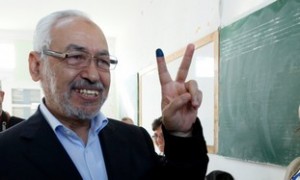Special to WorldTribune.com
CAIRO — Tunisia’s long-banned Islamist opposition has won what is
regarded as the first free elections in the North African state.
Officials said Ennahda party was the winner in parliamentary elections
held on Oct. 23 in Tunisia. They said Ennahda, banned for decades by the
former regime of President Zein Bin Abidine Al Ali, would command a majority
of the 217 seat parliament. An announcement on final results was scheduled
for Oct. 26.

Ennahda, which said it was modeled after Turkey’s ruling Justice and
Development Party, has pledged not to impose Islamic law on Tunisia. But
secular parties said Ennahda would follow the examples of other Islamic
parties that pledged to maintain secularism in their countries and then
slowly introduced Islamic rule.
“All the cards are now in Ennahda’s hands,” Nasser Eddin Dargouth, a
losing candidate for the Progressive Democrats Party, said.
On Oct. 24, Progressive Democrats chairman Maya Jbiri conceded defeat to
Ennahda. The secular party was said to have won no more than 20 seats.
“The first confirmed results show that Ennahda has reached first place,”
Ennahda executive party member Abdul Hamid Jalasi, who also managed the
campaign, said.
On Oct. 25, about 400 people demonstrated against Ennahda, accusing the
party of fraud. But Western observers deemed the elections free and said
they proceeded smoothly.
“The electoral process was marked by a peaceful and enthusiastic
participation, reflecting the people’s confidence in the democratic
transition,” John Hardman, president of the Carter Center, said.
Analysts said Ennahda would be the dominant political force in Tunisia
for years to come. They said the party’s absolute majority would also ensure
that it drafted Tunisia’s constitution as well as appoint the next
president.
This marked the first free election in the Arab world since the revolt
that swept such countries as Egypt, Libya, Syria and Tunisia in 2011.
Tunisia has been a leading Arab ally of the United States as well as venue
for defense production by European Union members.
Ennahda has asserted that it won 40 percent of the popular vote. The
party, however, was aligned with the Congress for the Republic, an Islamist
movement said to have come in second in elections.
“We would like to reassure our trade and economic partners, and all
actors and investors,” Jalasi said. “We hope very soon to have stability and
the right conditions for investment in Tunisia.”

You must be logged in to post a comment Login